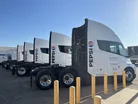PepsiCo Expands Electric Fleet Adding Tesla and Ford EVs

PepsiCo products are enjoyed by consumers more than one billion times a day across 200 countries and territories around the world. In 2023, PepsiCo generated more than US$91 billion in net revenue, driven by a complimentary beverage and convenient foods portfolio that includes iconic brands like Lay's, Doritos, Cheetos, Gatorade, Pepsi-Cola, Mountain Dew, Quaker, and SodaStream. These brands generate over US$1 billion each in estimated annual retail sales.
Expanding the Electric Fleet in California
PepsiCo North America is significantly expanding its electric-powered fleet across California, adding fifty Class 8 Tesla Semi trucks to its operations. These new additions will operate from PepsiCo's manufacturing and distribution facility in Fresno, California. Additionally, 75 Ford E-Transit electric vans will enhance the electrification of its equipment services fleet throughout the state.
Advanced facilities and training programs
PepsiCo's Fresno operation, a 170,000-square-foot manufacturing facility, distributes various PepsiCo products, including Pepsi, STARRY, Gatorade, Rockstar, and Aquafina. The facility has installed eight 750-kilowatt Tesla chargers and two Tesla Megapack Battery Energy Storage Systems to power the electric Semis.
As part of PepsiCo's commitment to its communities, it's deploying 75 Ford E-Transit electric vans across all 13 of its locations in California. These vans will serve various applications like sales deliveries and service support, contributing to a cleaner and healthier environment for local communities. This initiative also kicks off a job training program for students at Reedley College and Duncan Polytechnic High School, focusing on hands-on training in electric trucks and infrastructure maintenance for over 100 students annually, thereby investing in the future of communities where PepsiCo operates.
Pep+ initiative: A framework for sustainability
The deployment of EVs will contribute towards PepsiCo's ambitious Pep+, or PepsiCo Positive targets, which aim to achieve net-zero emissions by 2040. The Pep+ initiative aligns with the Advanced Clean Truck (ACT) standard introduced by the California Air Resources Board (CARB), a regulatory effort designed to accelerate the transition to zero-emission commercial vehicles.
"Our fleet electrification is an important part of our pep+ (PepsiCo Positive) strategy and illustrates how sustainability is a core business strategy at PepsiCo— good for the planet, good for our business, and good for the communities we serve," said John Dean, President for PepsiCo Beverages North America, West Division.
Pep+ is PepsiCo's strategic framework aimed at transforming its business operations to be more sustainable and beneficial for both people and the planet. The structure of Pep+ is around three main pillars:
- Positive Agriculture: Ensuring sustainable sourcing and regenerative agricultural practices.
- Positive Value Chain: Reducing greenhouse gas emissions, improving water use efficiency, and promoting a circular economy.
- Positive Choices: Reformulating products for better nutrition and increasing plant-based options.
Supported by strategic grants
Grants from the California Air Resources Board, the San Joaquin Valley Air Pollution Control District, and the California Energy Commission support PepsiCo's electric fleet expansion. These grants are part of California Climate Investments, a statewide initiative that allocates billions of Cap-and-Trade dollars to reduce greenhouse gas emissions, strengthen the economy, and improve public health and the environment, particularly in disadvantaged communities.
Demonstrating efficiency and commitment
PepsiCo's participation in the North American Council for Freight Efficiency's (NACFE) 2023 Run on Less Electric Depot showcased the seamless integration of electrified Semis into its business. Tesla Semis, which operates out of the Sacramento facility and has a fleet at Frito-Lay North America's (FLNA) Modesto, California, and Queens, New York facilities, demonstrated the company's commitment to sustainable logistics.
PepsiCo's bold move to expand its electric fleet underscores its dedication to sustainability and environmental stewardship. It sets a benchmark for the industry and paves the way for a greener future.
*******************
Make sure you check out the latest edition of EV Magazine and also sign up to our global conference series - Sustainability LIVE 2024.
*******************


